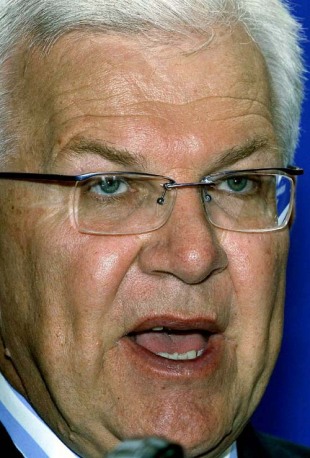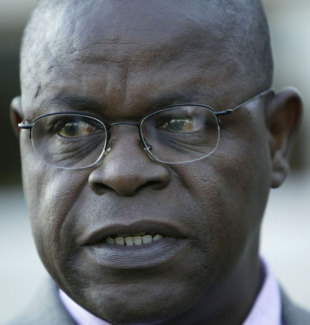|
|
|

The ICC should reveal the name of the man chosen to replace its chief executive Malcolm Speed
© Getty Images
|
|
| |
At the start of next week the great and the good from around the world assemble in Dubai for one of the most important meetings in the ICC's 99-year existence. Not since the Packer Circus has the ICC's executive board met against a backdrop of such upheaval in the structure of the world game. They not only have to select a chief executive, a potentially divisive task by itself, but have to confront a phenomenon that is threatening to rewrite the rules of game.
The Indian Premier League (IPL), which has left several boards floundering helplessly against the tide of cash on offer to their players, has cast a palpable shadow over recent months. The big question is if a window will be carved out in the international calendar for the franchise-based tournament which now has its roster the cream of international talent. Indications are that this is unlikely to happen. It can be argued that the Future Tours Programme (FTP) is flexible enough to allow it to accommodate the IPL. The real problem comes from the extra tournaments and one-day series the boards shoehorn into any gaps in the FTP, and that is down to them to address.
What is likely to happen is that there will be an agreement that national duty will get priority over the IPL. The clear message that will send is that domestic competitions are secondary.
As far as the ICL goes, the ICC has already made its position clear and the continuing ostracisation of those associated with it will continue informally between the various boards. As with so many things, these issues will dominate the more informal gatherings in which so much is actually decided.
The subject of Zimbabwe, the thorn in the ICC's side that won't go away, will again be raised. Almost two years after Zimbabwe Cricket started its own, largely discredited, forensic audit into accounts that many inside the country claim are seriously flawed, the ICC's own independent auditors, KPMG, are set to present their own report.
Even before the findings have been presented, the ICC finds itself in a no-win situation. It is certain that malpractices will be revealed - ICC chief executive Malcolm Speed himself pointed them out last June - but it is expected that ZC chairman Peter Chingoka will plead that Zimbabwe's economy is in such a mess and the local currency so worthless, that nobody adheres to standard practices and every business does whatever is necessary to function.
The ICC executive will have to decide whether to accept that argument. This is where politics comes into play. Chingoka has assiduously courted and received the backing of the Indian board in return for his support when push comes to vote. How strong that bond is, is likely to be tested to the full in Dubai, but it is predicted he will survive. The UK government are clearly suspicious, requesting a copy of the audit in advance because, as a Westminster source told Cricinfo, they suspect a potential cover-up and want to see what KPMG have to say for themselves.
|
|
|

A make-or-break few days for Peter Chingoka personally as well as for Zimbabwe Cricket
© Getty Images
|
|
| |
Assuming he lives to fight another day, Chingoka himself is also an issue as he is due in London in June for the ICC annual conference but the UK authorities, as things stand, have ruled him persona non grata and refused a visa. Behind-the-scenes meetings to try to get him into the UK have, so far, failed, and the executive will need to decide if they want to hold the meeting without one of their most senior members or move it abroad. Unless the government stands down, it is likely an alternative venue will be sought. That could raise warning signs about next year's ICC World Twenty20 in England where even if Zimbabwe are allowed, Chingoka again might be turned away.
As if that was not enough, Darrell Hair has almost completed the rehabilitation programme agreed with the ICC at the collapse of his racial discrimination tribunal in October. He remains in contract until March 2009 and at some stage the bullet will have to be bitten and a decision made what to do with him. If his rehabilitation has gone well then it becomes hard not to allow him back - by the ICC's own admission he is a good decision-maker - but harder to see how several countries will permit it. A behind-the-scenes compromise seems the only way out.
Recommendations made by the ICC's chief executives committee last month will also be discussed, including the greater use of technology, with a possible "umpire decision review system" which, if approved, could be trialled as early as this July when England meet South Africa at Lord's. After the ructions in Australia during the visit of India, a zero-tolerance approach to inappropriate public comment and abusive behaviour by players, team officials and individual board members will be affirmed.
The format for the 2011 World Cup will also be approved, but the horse-trading has long since finished and the recommendation of the host countries - a 14-team format with two initial groups of seven - certain to be rubber-stamped.
Martin Williamson is executive editor of Cricinfo



